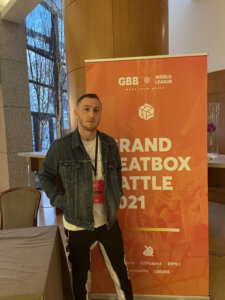How a Jewish folk song made it into a chart-topping rap banger
16-year-old producer Aviad Poznansky learned ‘Yoel’s Niggun’ at Jewish summer camp. Now, it’s part of rapper JID’s newest hit, ‘Dance Now.’

JID performing at the Governors Ball music festival in New York City. Photo by Getty Images
Notes from the summer camp office are not usually a good omen, especially when they begin with the words “from your mother.” But for 16-year-old music producer Aviad Poznansky, this past summer at camp was anything but business as usual — and the note was no exception.
“Please take plenty of time to think and write everything correctly,” said the note, which was handwritten on the outside of an envelope containing legal documents. “It is very important that you not omit anything. After completing and signing both forms, please return to the office ASAP to return (scan) to your mother, preferably today.”
Aviad had to handle paperwork for “Dance Now,” the second single off of Atlanta rapper JID’s third album “The Forever Story,” which he helped produce and which samples the work of Jewish folk group Zusha. It was a milestone few teenagers achieve. But in most ways, he was just like the rest of his peers at New Hampshire’s Camp Yavneh: Since he didn’t have a phone, the summer camp’s office had to play intermediary between him and his mother.
“The Forever Story,” which dropped Aug. 26 to critical acclaim, is an introspective, autobiographical album. “Dance Now,” which tries to reconcile JID’s difficult childhood in Atlanta with the experience of making it big in the music world, samples Zusha’s song “Yoel’s Niggun,” and taps into the sample’s religious foundations throughout, particularly in the chorus: “You dance with the devil, you never dance again.”
A nigun (sometimes spelled “niggun”) is a prayer tradition of singing syllables like “yai lai lai” or “bum bidi bum” in place of words.
“I think JID appreciated the essence of what a nigun is,” said Elisha Mlotek, a founding member of Zusha and co-writer on the track. It “is a musical prayer. It’s a way to connect to life and a way to connect to one’s faith.”
— aviad (@aviadpoz) August 21, 2022
Mlotek, who is now working on a new album away from Zusha, is thrilled by the crossover hit, and is quite proud of the young Jewish producer behind it. “I think he’s going places,” Mlotek added.
Part of what drives Aviad’s success is his meticulous nature, which was on display throughout our conversation. The producer carefully scheduled his interview around driver’s ed classes, and deftly — if slightly impatiently — corrected a question that compared “Yoel’s Niggun” with klezmer music.
When it comes to musical collaborators, Aviad is just as picky. He wants to work with other artists who have both a distinctive vision and a taste for Middle Eastern-inflected samples.
Classically trained in piano and a former violinist in his school’s orchestra — performing Beethoven’s Fifth Symphony “was my favorite musical experience,” he said — Aviad turned to music production during the pandemic. He downloaded FL Studio, a music-making software popular among hip hop and pop producers, and started making his own beats. Connecting with other artists, he eventually started making entire songs, a project that culminated in a self-produced 2021 album titled “Believe.”
But Aviad knew that to grow, he would need to network. That’s why he connected with Christo, the executive producer of “The Forever Story.”
Compared with other big producers, Aviad noticed, Christo was surprisingly accessible. At the time, Christo’s Instagram profile included his email and a private Discord server, or chat room, where young producers could share their work with him and improve. There were a couple hundred people in the server, but only a handful were active. Aviad knew this was his in.
For a young producer, Aviad explained, the best way to stand out is to create “loops,” which are basically “chopped up samples with no drums or your own melodies.” The key to a good loop is to find something catchy, something that will stick in your head. Something like a nigun.
And Aviad knew just the nigun. Long after he finished camp the previous summer, Aviad found himself humming a melody that one of his counselors often played as they walked to activities. “I was like, ‘You know what that one’s called? I want to sample it,’” Aviad recalled. It was “Yoel’s Niggun.” Aviad “chopped” the song and sent the samples off to Christo.
Though Aviad had no way of knowing that his sample would become part of “Dance Now,” he sees a deep structural and thematic connection between the concept of a nigun and the way Christo and JID did with his work. A nigun, explained Aviad, is “something amazing that can uplift the whole community. Everybody — no matter where they’re from — can take part because it doesn’t have any words.” When a group sings a nigun, each person can find their own interpretation of the music. For JID, this particular nigun led him to “Dance Now.”
In a funny twist of fate, this is the second time “Yoel’s Niggun” is a single ahead of an album. Eight years ago, in the leadup to Zusha’s eponymous first EP, “Yoel’s Niggun” was Zusha’s first song ever released. “The vision of Zusha was to connect with all people,” says Mlotek, echoing Aviad’s analysis of what a nigun is about. “So this collaboration does that, and it’s cool that ‘Dance Now’ is the lead single.” (The current members of Zusha, Shlomo Gaisin and Zachariah Goldshmiedt, declined to comment for this story.)
Aviad shared this perspective as well. To see a “Jewish song being sampled in hip hop, which is my favorite genre, is not something that I had ever seen in my life,” he said. “I want Jewish kids, especially, who don’t see themselves represented in the music they listen to … feel like they’re in that.”
If the reception to “Dance Now” at Camp Yavneh is any indication, Jewish kids definitely appreciate the representation. The night the single was released, the campers stayed up until midnight.
“We got the whole bunk around the speaker, and we went crazy over every line,” Aviad said. “And in the morning, we went down and we played it over the huge speakers at breakfast for everybody.”






















